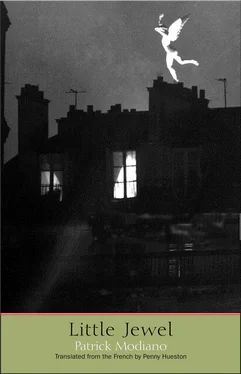I was pleased to see the green light. I don’t know why, but I found it comforting, like those lights left on in the hall outside children’s bedrooms. If they wake at night, they’ll see light through the half-open door.
‘Does it annoy you if I leave the radio on? I’m doing it just in case, to make sure I don’t miss the program.’
Then I heard music, similar to the music I’d heard the other night when I was in the bedroom at Rue Coustou with the pharmacist. A pure, clear sound, conjuring the image of a girl sleepwalking across a deserted square at night, or the wind blowing down an esplanade in November.
‘Is the background music annoying?’
‘No.’
If I had been listening to it by myself, I would have found it depressing, but with him it didn’t bother me at all. On the contrary, I found the music soothing.
‘And do you still remember the address of the huge apartment?’
On the cover of my mother’s diary, after the instruction: ‘If lost, return this diary to…’, I recognised her large handwriting: ‘Comtesse Sonia O’Dauyé, PASSY 15 28.’
‘I even remember the telephone number,’ I told him.
I had dialled it so often from the booth in the café. One of the customers had commented that I was ‘the little girl from 129’. It was late afternoon when I got home from Saint-André and no one came to answer the door. Neither my mother, nor the Chinese cook, nor his wife. The Chinese cook would get back around seven o’clock, but Comtesse Sonia O’Dauyé might not get back until the next day. Every time, I consoled myself that she hadn’t heard the doorbell. She would definitely hear the phone ringing. PASSY 15 28.
‘We could always try calling the number,’ Moreau-Badmaev said, smiling.
In twelve years, the idea had never occurred to me. One day at Fossombronne, when I heard Frédérique say she’d gone once to Avenue Malakoff to collect some of my mother’s belongings, I wondered what belongings she meant. The portrait by Tola Soungouroff? But she said she wasn’t able to enter the apartment: there were red wax seals fastened onto the door. That night I dreamed that my mother had a burn mark on her shoulder, branded with a hot iron.
‘PASSY 15 28, you said?’
He picked up the phone from the floor next to the bedside table and placed it on the bed. He held the receiver out to me and dialled the number. Back when I was living in the apartment, I had difficulty reading the letters and numbers on the dial in the phone booth at the café.
The ringing went on for a long time. It had an odd, muffled, reedy sound. Who might be living in the apartment now? The real owners, probably. The real children — the ones referred to on the board in the kitchen — had reclaimed the bedroom that I had no right to occupy for two years. And the real parents must be in the bedroom where my mother used to sleep.
‘Seems like no one’s answering,’ Moreau-Badmaev said.
I held the receiver up to my ear. In the end, someone picked up, but no one answered. Men’s voices, women’s voices, voices from close by, voices from far away. They were trying to call each other and find a way to begin to answer each other. Every now and then, I distinctly heard two people talking to each other and their voices drowned out the others.
‘The number is no longer in use. So people are using it to make contact and arrange to meet. It’s called the Network.’
Perhaps all those unknown voices were individuals from my mother’s diary whose telephone numbers didn’t answer any longer. I could also hear a sort of rustling, the wind in the leaves, in summer, on Avenue Malakoff. I concluded that, since we had left, no one had lived in the apartment, except ghosts and these voices. The wax seals were still on the apartment door. The windows had been left wide open: that was why you could hear the wind. The electricity was off, like on the night of the air raid when I was so terrified that I ran to find my mother in the living room. She lit candles.
She didn’t have many visitors. Two women often came: fat Madeleine-Louis and Simone Bouquereau. Later on, I saw them again in Frédérique’s house in Frossombronne, but they avoided me and definitely didn’t want to talk about my mother. Perhaps they were ashamed of something.
Simone Bouquereau had a head like a little blonde mummy, and I was shocked by how thin she was. The brunette said that Simone had ‘been in rehab’. One evening, after dinner, she thought I had gone up to bed and she was talking about the past with Frédérique. ‘Simone was the one who kept up poor Sonia’s supplies,’ she said. I wrote the words down on a scrap of paper. There were so many of their conversations I eavesdropped on, from the age of fourteen, in an attempt to understand. I asked Frédérique what it meant. ‘Every now and again, ever since her accident, your mother took morphine.’ I had no idea what accident she was referring to. Her ankles? Apparently morphine is a good cure for pain.
I still had the receiver up to my ear. The voices were drowned out by the rustling of the wind in the leaves. I pictured the wind slamming the doors and windows, blowing flurries of dead leaves onto the parquet floor and onto the steps covered in white plush in the living room; I imagined, too, the plush decayed and turned into moss, the glass in the windows broken; hundreds of cats overrunning the apartment, as well as black dogs, like the one she had lost in the Bois de Boulogne.
‘Do you recognise someone’s voice?’ Moreau-Badmaev asked. He put the handset on the bed and smiled at me.
‘No.’ I hung up and put the telephone back on the floor. ‘I’m frightened of going home by myself,’ I said.
‘But you can stay here.’ He shook his head as if it was obvious. ‘I have to work now. I hope the noise of the radio doesn’t disturb you.’
He left the bedroom, then came back with an old lampshade that he somehow attached to the tripod. The light from the globe became even more hazy. Then he sat on the edge of the bed, next to the radio, and placed the writing pad on his knees.
‘The light isn’t too strong for you?’
I replied that it was just right as it was.
I was lying on the other side of the bed, the side in shadow. On the radio, I heard the voice from earlier, just as guttural. Again, the silences between sentences. At intervals, he wrote words on his pad. I could no longer take my eyes off the green light and I drifted off to sleep.
ON WEDNESDAY, THE pharmacist was back from Bar-sur-Aube. I called her and she said we could get together in the evening. She suggested I meet her in her neighbourhood, but once again I was frightened of taking the metro and travelling across Paris by myself. So I invited her to have dinner in the café on Place Blanche.
I wondered what I could possibly do until evening. I didn’t feel up to going back to Neuilly and looking after the little girl. What I most dreaded was walking along by the Bois de Boulogne, near the Jardin d’Acclimatation, around where the dog had gone missing. Almost every day, I used to go walking with the dog in the vicinity of the Porte Maillot. Luna Park was still there then. One afternoon, my mother asked me if I’d like to go to Luna Park. I thought she was going to take me. But no. When I think about it now, I imagine she just wanted me to leave her alone that afternoon. Perhaps she had a rendezvous with the man whose name no one ever knew and thanks to whom we were living in that apartment. She opened the built-in cupboard in the living-room wall, held out a big banknote. ‘Go off and have fun at Luna Park,’ she said. I had no idea why she was giving me so much money. She seemed so distracted that I didn’t want to upset her. Outside, I considered not going to Luna Park. But when I got back she would probably ask me questions, demand that I show her the entry ticket or tickets for the rides. She often fixated on certain things and it was not worth trying to lie to her. And, anyway, at that time I didn’t know how to lie.
Читать дальше












